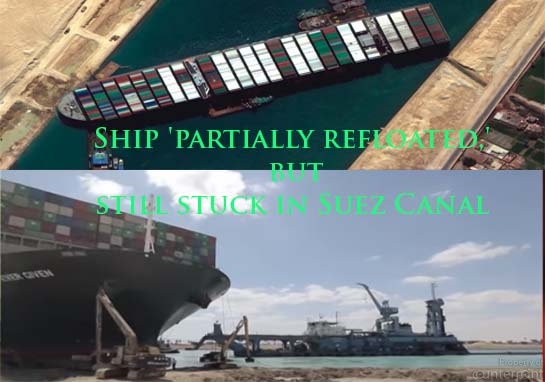Engineers on Monday “partially refloated” the colossal container ship that remains wedged across the Suez Canal, a canal services firm said, without providing further details about when the vessel would be set free.
For nearly a week, the skyscraper-sized Ever Given hauling goods from Asia to Europe has blocked maritime traffic through the vital artery, holding up $9 billion each day in global trade and straining supply chains already burdened by the coronavirus pandemic. Over 300 vessels, carrying everything from crude oil to cattle, are waiting to pass through the canal, while dozens more are taking the alternate route around the Cape of Good Hope at Africa’s southern tip, adding some two weeks to journeys and threatening delivery delays.
The partial freeing of the vessel came after intensive efforts to push and pull the vessel with 10 tugboats when the full moon brought spring tide, raising the canal’s water level and hopes for a breakthrough. However, it was clear that challenges remained, as satellite data from MarineTraffic.com showed the ship in the same position, surrounded by a squadron of tugs with its bulbous bow stuck in the canal’s eastern bank. A top pilot with the canal authority, speaking on condition of anonymity, confirmed that the ship had been partially refloated and said that workers were still struggling to dislodge the bow.
Lt. Gen. Osama Rabei, the head of the Suez Canal Authority, said workers continued “pulling maneuvers” to refloat the vessel early Monday.
Overnight, several dredgers had toiled to vacuum up 27,000 cubic meters of sand and mud around the ship. Another powerful tugboat, Carlo Magno, was racing to the scene to join the efforts.
Although the vessel is vulnerable to damage in its current position, Shoei Kisen Kaisha Ltd., the company that owns the Ever Given, dismissed concerns on Monday, saying that the ship’s engine was functional and it could pursue its trip normally when freed.
Ship operators did not offer a timeline for the reopening of the crucial canal, which carries over 10% of global trade, including 7% of the world’s oil. The unprecedented shutdown could affect oil and gas shipments to Europe from the Middle East.
Canal authorities have desperately tried to free the vessel by relying on tugs and dredgers alone, even as analysts warned that 400-meter-long ship may be too heavy for such an operation. As a window for a breakthrough narrows with high tide receding this week, fears have grown that authorities would be forced to lighten the vessel by removing the ship’s 20,000 containers – an complex operation, requiring specialized equipment not found in Egypt, that could take days or weeks. (Economic Times of India)





